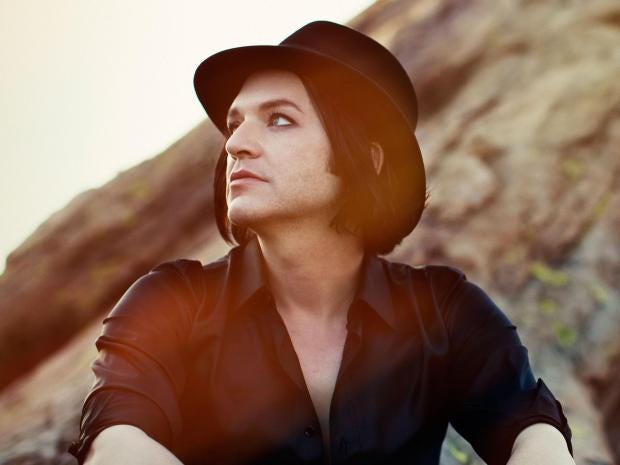Placebo Interview with Brian Molko: ‘We embraced the rock n’ roll lifestyle with enormous enthusiasm’

“I’d rather we were considered a marmite band than for us to be seen as inoffensive and easily forgettable, so I don’t have a problem with generating love or disgust for our band; that’s not an issue for me at all!”
It’s fair to say that Brian Molko, lead singer and songwriter for Placebo, the band he’s fronted now for 23 years, is well aware of their reputation for garnering praise and scorn in almost equal measure. As is made obvious from the quote above, he is perfectly at ease with such a perception, even historically going so far as to positively encourage disdain from those who he himself holds in contempt.It’s exactly this desire to goad, challenge and confront that has made Placebo one of the most interesting and remarkable bands of the past 30 years, even if the majority of the British music press were initially too busy trying to work out the sexuality of individual band members to notice. After all, what band ever achieved anything worthwhile by straddling the middle of the road? “We had the capability to deal with the press at the time; it was a bit like pouring petrol on a fire” he says, before adding with a cheeky grin which implies that he might not be entirely serious “we’re far more sensitive these days.”
Given Placebo’s history with the press, one might think that Molko would be at best wary, at worst down-right hostile towards journalists. When I meet up with him prior to a rehearsal for the last leg of the band’s current retrospective tour however, any fears of a frosty reception are allayed almost immediately. Instead this afternoon, he proves to be warm, friendly, engaging and never too far away from erupting into fits of laughter. He speaks slowly in that familial, nasal tone that gives Placebo one of the distinct characteristics that people either adore or abhor and provides, considerate, well-thought out answers to all my questions, even being so gracious as to extend our interview not just once, but twice.
“We got thrust into the limelight very quickly and we embraced our early success with a lot of glee’ he says between drags on a cigarette and with a glint in his eye. ‘We had this feeling of utter disbelief, as if we were naughty schoolchildren that had fooled everyone and were about to be found out any minute. So we embraced the rock n’ roll lifestyle with enormous enthusiasm, as I think every young band should, you know? It’s a rite of passage and it comes with the territory. We were surprised by how well the first album did, particularly when ‘Nancy Boy’ got to number 4 in the charts and we had to perform it on Top of the Pops; that really had never been a part of the plan! Our motivation was simply to never get a job in an office; we expected to hopefully be able to pay the rent and put food on the table and we would have been very satisfied with that but the universe had different plans for us. We stuck out like a sore thumb in a music scene where Britpop was king; the timing was accidental but it also proved to be rather fortuitous for us.”
Bolstered by this unexpected serendipity, Placebo pranced cocksure and panda-eyed into a musical landscape awash with macho posturing and male bravado. Their heroes, Lou Reed, Marc Bolan and David Bowie among them, had all pushed the boundaries of androgyny and sexuality in the 70s but Placebo found themselves thrust unwillingly into a musical landscape that, broadly speaking, had little time to confront the prudish attitudes of the bourgeois.
“I wanted to challenge the homophobia that I was witnessing in the music scene” says Molko. “I wanted anybody who was slightly homophobic to show up at our gigs and think ‘Oh, I really fancy the singer. She’s hot!’ only to find out later that the singer was called Brian, which would hopefully lead them to go home and ask themselves a few questions. Of course the cross-dressing was an aesthetic choice but for us, it was also a political act; that was a very big part of what we were trying to achieve at that time.”
21 years have passed since the band first came into public consciousness and Placebo are still here whilst Cool Britannia is most certainly not, replaced instead with a more overt, pervading sense of fear, bigotry and xenophobia – in 2017, we’re about as far away from the pervading mid-90s attitude of incandescent national pride as it’s possible to get. Placebo had the common sense not to ride the Britpop wave, which in 1996 was already beginning to show signs of dissipating, and have consequently remained whilst so many of their contemporaries fell by the wayside. In fact, one could argue (as Molko does) that Placebo are more pertinent now at the beginning of the 21st century than they ever were at the end of the 20th.
“The message that we bring when we go anywhere and play a concert is a message of tolerance, understanding and acceptance and it’s quite a wonderful thing, because what Placebo became very early on, was a band for the outcasts, the misfits, the square pegs in the round holes. We didn’t set out to do that but that’s what we became and of course myself and Stefan (Olsdal, Molko’s partner in crime since the band began in 1994) grew up feeling like we didn’t fit in and just by virtue of being honest and open about that, we appealed to a great number of people who felt that there wasn’t necessarily a voice for them. And that continues to this day, this really big community that has grown around us and identifies with what we represent.”
This current tour, titled A Place for Us to Dream – 20 Years of Placebo, marks two decades since the release of the 1996 self-titled debut album (for fans of pedantry, the tour began in 2016) and enables the band to look back on their career thus far, an uncharacteristic move for the band. Molko has always been startlingly honest on his feelings towards some of Placebo’s earlier material, to the point where, these days at least, he seems to have become his own harshest critic.
“I was terrified at the beginning of this tour” he confesses. “I was quite frightened about the prospect of how I was going to feel re-visiting a lot of this old material for 18 months. I was struggling to make an emotional connection to those old songs, which is kind of why we stopped playing them in the first place. If we were less contrary and more career-driven, then we would just play what people want to hear but performing is an act that fills our souls and that means that we need to get something out of it too. We’re not interested in stepping out on stage and simply trying to make everybody happy, because that would be a mistruth. What we are interested in is telling our truth and in order to do that, we need to have an emotional connection to the music and the audience, otherwise it’s merely a mechanical act and personally, I’m not interested in engaging in a mechanical act in front of thousands of people.”
All of which makes the idea of a retrospective tour seem less a place for us to dream and more a place for Molko to re-live a monotonous nightmare night after night for the best part of a year; so what changed? “After the first couple of gigs, I realised I could make a connection through the sheer joy and love that was coming back to us from the audience” he says. “It was really quite overwhelming when they heard these songs which we had buried for so long. I realised that making people happy is actually an extremely rewarding experience and that became the fuel in the tank for us. The audience is vital in a live situation, you need to have that interaction with them, otherwise it’s very difficult to perform and when they hear ‘Pure Morning’ or ‘Nancy Boy’, they go absolutely wild!”
Ah yes, “Pure Morning” and “Nancy Boy”, two of the most beloved songs in the band’s back catalogue (they’re currently the 4th and 9th most played Placebo songs on Spotify respectively) and in keeping with his contrary character, two of the most derided by Molko himself. If one were to cast a beady critical eye over the band’s body of work, it would be difficult to acknowledge either song as the absolute pinnacle of their career but by the same token, neither deserve heaps of scorn either. What is it exactly about these two songs in particular that causes such anguish for the author?
“’Nancy Boy’ I consider quite a naive piece of writing; it’s so simple that it’s borderline moronic in a musical sense. I’ve never had a problem with ‘Pure Morning’ musically, but you have to understand that we wrote it during a B-sides session once the album was finished. It was never intended to be a single, but the record company heard it and went ‘there’s your single’. And we said ‘really?’ If I had realised it was going to go on the album, I probably would have spent a little more time on the lyrics but I was more interested in how we were using loops and new techniques in the studio at the time.”
It was also around this time that the band collaborated with David Bowie on a re-recorded version of the title track from their sophomore album Without You I’m Nothing, arguably the band’s most beloved and cherished record to date. “That song is very misunderstood” says Molko, “it is not a love song, the narrator is suffering from pathological low self-esteem. It’s about co-dependence, feeling like you don’t have an identity without somebody else.”
Inevitably, the song has taken on a whole new meaning with a far deeper resonance for Molko since Bowie’s death in January 2016. In Placebo’s early days, when critics were taking seemingly every opportunity they could to make cheap swipes at the band, it was Bowie’s patronage that garnered them credibility in the eyes of a music press that were dumb enough to be disorientated by a bloke in a dress. As was his wont, Bowie took the band under his wing, making regular live appearances with them, inviting them out on tour and providing sound counsel and mentorship.“We’ve been flashing up images of David whilst playing ‘Without You I’m Nothing’ on this tour and some nights it’s been such an emotional experience that I’ve come very close to breaking down into tears” Molko confides. “There was a point during the summer where I said to Stefan ‘I’m not too sure if I can play this anymore, it’s tearing me apart’. But I’ve got over that now and instead, it has become a celebration of who David Bowie was and the impact he had on me as a human being, as well as a musician. The best advice he ever gave us was ‘whatever you do, never lose your spontaneity’. David was always one for taking left-corners and going off on tangents and I think he infused a courage in us to do exactly that, to constantly re-invent ourselves. So yes the significance has changed, it’s become a lot more about David for me, which is ok. He’s kind of constantly with me at the moment, which is quite sweet and I reflect on our conversations, on his advice and what it was like to see him play every night for five years when we were touring together; he’s like my guardian angel!”
With this tour seemingly as good a time to reflect on their career as any, I take the opportunity to ask Molko if there is a particular song that he is most proud of over the 100+ he’s written for the band in the last 23 years. “Every single band wants to do two things; 1) they want to write that one song that is such a big hit that they never have to work again. And 2) they want to write a song which transcends the identity of the band itself. I think we finally managed that ourselves with the last track on Loud Like Love which is a song called ‘Bosco’. You don’t need to know anything about Placebo for that song to grasp you emotionally or to connect with the story in that song because it is so vulnerable. It transcends the band’s identity, it can exist without needing any context from the band in order for it to have the desired emotional impact. In my eyes, that’s the making of a timeless song that can go on to mean a great deal to people long after we’ve shuffled off this mortal coil.”But what of the future of Placebo? Molko reveals that he is currently writing songs for the band’s as yet untitled 8th album, a project that will no doubt become the main focus of their 2018. “I’d like the next record to reflect the pain, frustration and violence that we’re seeing on the news on a daily basis” he says. “I’d like it to be a record of the times because I’ve lived in London for 27 years and I honestly have never seen anything quite like the political climate we’re living in today, both in the UK and in the US. We’re going backwards rather than forwards; everyone’s on edge and a sense of fear pervades with terrorist attacks and world leaders threatening to wipe other countries of the face of the planet. And alongside that, I also believe that we’ve entered the most narcissistic age that I’ve ever experienced in my lifetime thanks to the way that technology has developed. I don’t necessarily think that level of self-entitlement is healthy for us as a society. These are very inspiring times for artists and creative types.”
Source:-independent




